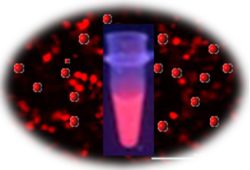- +1 858 909 0079
- +1 858 909 0057
- [email protected]
- +1 858 909 0079
- [email protected]

Products
Cat. No.
Product Name
Unit Size
Order
Fluorophore
Excitation
(nm)
Emission
(nm)
Fluorescence lifetime
(Ԏ) (µsec)
Stokes shifts
(nm)
Selection of
Emission Filter
Red
340
615
730
275
620/40
Fluorescence Dye Properties
Fluorophore
Red
340
615
Fluorescence lifetime (Ԏ) (µsec)
730
Stokes shifts
(nm)
275
Selection of
Emission Filter
620/40
Specification
Bead Size
2.5μm diameter; 5μm diameter
Number of Beads
~10 x 107 beads/mg (2.5μm), ~5 x 107 beads /mg (5μm)
Magnetization
~40-45 EMU/g
Type of Magnetization
Superparamagnetic
Concentration
10 mg/ml (10mM Tris, 0.15 M NaCl, 0.1% BSA,1 mM EDTA, pH7.4)
Binding Capacity
Biotinylated BSA / ml of Beads
>1 mg/ml
Biotinylate single-stranded oligonucleotides
~ 2,000 pmoles /ml
Storage
Ship at room temperature. Store at 4°C. Do not freeze.
BcMag™ Streptavidin-Europium Fluorescence Magnetic Beads are Time-Resolved Fluorescence (TRF) magnetic microspheres covalently coupled with streptavidin protein. The beads are manufactured using nanometer-scale superparamagnetic iron oxide and europium metal as core and entirely encapsulated by a high-purity silica shell, ensuring no leaching problems with the iron oxide and europium metal. The microspheres combine the benefits of a novel streptavidin biotin-binding method, time-resolved Fluorescence dyes, and magnetic characteristics to perform very sensitive assays.

Streptavidin is a tetrameric biotin-binding protein that originates from Streptomyces avidin and has a mass of 60 kDa. It has no carbohydrates and lower pI, giving a lower degree of nonspecific binding, making streptavidin an ideal reagent choice for many detection systems.
Streptavidin and its analogs have become powerful tools for probes and affinity ligands for various applications in biochemical assays, diagnosis, affinity purification, and drug delivery.
Although conventional fluorophores have been widely used over the past decades, they still suffer from either one or several limitations in terms of applicability and efficiency:
1.
Narrow excitation bands cause higher background signals.
2.
Smaller Stokes shift often produces self-quenching.
3.
Fluorescence is sensitive to environmental factors such as metallic ion concentration, pH, temperature, and solvent polarity.
4.
Fluorescence intensity is not high enough for detecting a single biomolecular.
5.
Fluorescence intermittency (blinking) affects some processes of molecule detection.
6.
Easily aggregated because of hydrophobicity.
BcMag™ TR-FRET Assay, in contrast to typical FRET (Förster Resonance Energy Transfer) assays, uses time-resolved Fluorescence magnetic beads (BcMag™ TR-Magnetic Beads) as the donor fluorophore. The donor and acceptor can be two proteins, two DNA strands, an antigen, an antibody, or a ligand and its receptor. After a reasonable time delay (usually 50 to 100 s), a signal is generated by fluorescence resonance energy transfer between a donor and an acceptor molecule when they are close and monitored in a time-resolved way. In BcMag™ TR-FRET Assay, a trace amount of analytes can be easily enriched from the complex by TR-Magnetic Beads, resulting in higher sensitivity. This assay practically eliminates all fluorescence backgrounds caused by the sample and plastic microplate, as well as by direct acceptor excitation. As a result, the signal-to-noise ratios of the BcMag™ TR-FRET Assay are very high, and the background is quite low. Furthermore, the assay does not need washing steps. BcMag™ TR-FRET Assay offers substantial advantages to bioassays in high throughput screening, such as assay flexibility, dependability, increased assay sensitivity, higher throughput, and fewer false positive/false negative results.
Europium cryptate fluorophore is an efficient time-resolved Fluorescence tag due to its distinct specific properties. It is excited at 340nm and emits red fluorescence at 615nm, with a long fluorescence lifetime (730 μsec) and large stokes shifts (275 nm). By taking advantage of these properties, time-resolved fluorescence measurement can dramatically reduce the fluorescence background from the sample and increase the signal-to-noise ratio to offer detectability better than one order of magnitude than conventional Fluorescence dyes. BcMag™ Streptavidin-Europium Fluorescence Magnetic Beads are excellent donors used in TR-FRET assays.
1.
Mix the antibody-conjugated donor beads with the cell lysates and incubate them with continuous rotation for a sufficient time. The beads remain suspended in the sample solution during mixing, allowing the target analytes to bind to the donor beads.
2.
After incubation, the beads are collected and separated from the sample using a magnet rack.
3.
Add the antibody-conjugated acceptor and incubate them with continuous rotation for a sufficient time.
4.
Analysis of numerous microplate readers supports TR-FRET measurements.

1.
Perform a double function simultaneously on the same beads: The magnetic beads combine separation/preconcentration and detect analytes, allowing quick, simple, robust, and high-throughput analytes of trace amounts from complex biological samples on the same beads.
2.
Ultra sensitive. Lower detection limits of 10 pg/mL versus typical fluorometric detection limits of 100 pg/mL.
3.
Extremely photostable and highly resistant to photobleaching. All the lanthanide chelate or cryptate molecules and iron oxide are entirely encapsulated inside each bead instead of merely on the bead’s surface. The protective environment prevents iron oxide and dye from leaching into aqueous media, which makes the beads less sensitive to external conditions such as solvent, temperature, pH, etc.
4.
Very high Fluorescence intensity. Because a single bead has a large concentration of lanthanide chelate with a high quantum yield ranging from 40 to 90%, the beads show excellent fluorescence intensity, which increases test sensitivity without signal amplification. Such bright beads are also perfect for donors’ use in time-resolved FRET assays.
5.
Lanthanide chelate or cryptate has large Stokes shifts (>250 nm), narrow emission bands (-10 nm bandwidth), and long fluorescence lifetime (μs), which dramatically reduces background and increases the signal-to-noise ratio.
6.
Most bioprocess ELISA assays can be converted to an HTRF assay.
7.
No washing step is involved in the assays.
8.
Have a hydrophilic silica surface grafted by different functional groups with linkers of variable lengths, allowing efficient conjugation of various ligands such as peptides, proteins, antibodies, small molecules, carbohydrates, aptamers, DNA/RNA, etc.
9.
Due to the microsphere’s magnetic properties, the Fluorescence magnetic beads are suitable for high-throughput automation.
Magnetic Beads Make Things Simple